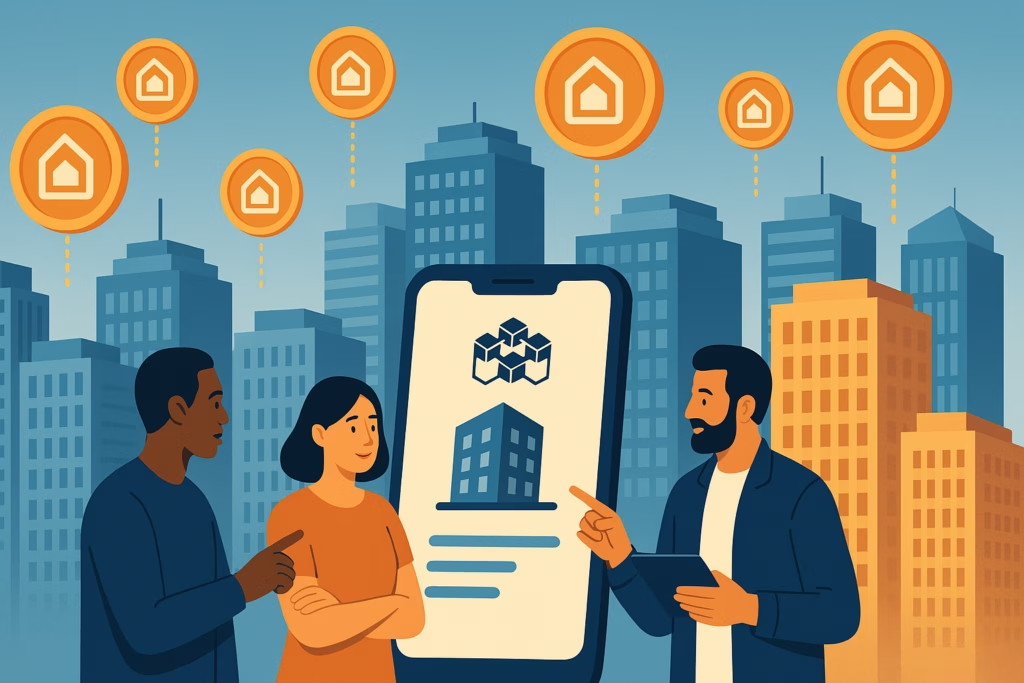Tokenization is evolving fast—moving beyond real estate into music rights and structured data. Platforms are enabling fractional ownership of physical and digital assets, while new standards like ERC-7208 pave the way for AI-ready tokenized datasets. This marks a new phase of Web3 infrastructure where compliance, utility, and composability are prioritized.
“The investor owns tokens which represent an economic interest in the underlying asset…”
— Samuel Lee, CEO of Fraxtor.
Innovations in Tokenization are redefining various sectors by converting physical and digital assets into blockchain-based tokens, enhancing accessibility, liquidity, and transparency. Recent developments in real estate, African economic initiatives, and the music industry highlight the transformative power of this technology.
Reental’s $RNT Token: Democratizing Real Estate Investment
Reental, a Spanish proptech company, has introduced the $RNT token, aiming to revolutionize real estate investment through fractional ownership. This approach allows investors to participate in property markets with reduced capital requirements, enhancing liquidity and accessibility.
Key Features of $RNT:
- Fractional Ownership: Investors can acquire digital tokens representing shares in real estate assets, making property investment more accessible.
- Enhanced Liquidity: Tokenization facilitates easier buying and selling of property shares, addressing traditional real estate’s illiquidity.
- Community Engagement: $RNT holders gain access to exclusive services and participate in strategic company decisions, fostering a collaborative investment environment.reental.co+1reental.co+1
Reental’s platform leverages blockchain technology to streamline investment processes, reduce costs, and improve returns. By offering early access to premium assets and integrating decentralized finance (DeFi) tools, Reental provides a modern approach to property investment. reental.co
Africa Tokenization Council: Advancing Blockchain and AI Adoption
The Africa Tokenization Council, introduced by COTI, aims to promote blockchain and artificial intelligence (AI) adoption across Africa and the Middle East. This initiative seeks to modernize regulations, attract international investments, and stimulate economic growth in the region.
Objectives of the Council’s Innovations in Tokenization:
- Regulatory Modernization: Collaborate with governments to develop frameworks that support blockchain and AI innovations.
- Investment Attraction: Position Africa as a hub for technological advancements, drawing global investors.
- Educational Initiatives: Provide resources and training to foster local talent in blockchain and AI sectors.itheum.io
By addressing challenges such as financial inclusion and infrastructure development, the council aims to harness technology to improve lives and create new economic opportunities across the continent.
Itheum and Walrus: Innovations in Tokenization Music and AI Data Assets
Itheum, a data tokenization protocol, has partnered with Walrus to tokenize music and AI data assets, enhancing the storage and trading of large data files. This collaboration benefits musicians and AI developers by providing new avenues for monetization and data management.
Implications for the Music Industry:
- Data NFTs: Musicians can tokenize their work as Non-Fungible Tokens (NFTs), ensuring ownership rights and creating new revenue streams.
- AI Integration: The platform enables AI-driven music management, allowing artists to leverage technology for content creation and distribution.freebitco.in
Itheum’s infrastructure supports decentralized data brokerage, empowering users to control and monetize their data. This partnership exemplifies how blockchain and AI can converge to revolutionize data-intensive industries.

Conclusion
The advancements by Reental, the Africa Tokenization Council, and the Itheum-Walrus partnership demonstrate the vast potential of innovative tokenization in transforming industries. By leveraging blockchain and AI technologies, these initiatives are paving the way for more inclusive, efficient, and innovative economic landscapes.
❓ FAQ – Innovations in Tokenization: Real Estate, Music, and Data
Real estate tokenization is rapidly expanding with platforms enabling fractional property ownership and on-chain trading. Music and data industries are tokenizing copyrights and datasets, using new compliance-ready standards like ERC-7208 to structure AI-ready data tokens.
Because tokenization breaks down barriers—allowing fractional access to high-value assets, enabling global liquidity, and linking traditional markets with blockchain. Experts say real estate tokenization could hit $4 trillion by 2035.
Companies like Fraxtor in Singapore are leading regional efforts. As Fraxtor’s CEO Samuel Lee notes: “The investor owns tokens which represent an economic interest in the underlying asset…”—a structure aimed at expanding retail access under MAS‑licensed frameworks.
Nexera is building AI‑powered data tokenization using ERC‑7208, creating enforceable, structured datasets. That partnership demonstrates how tokenization is evolving beyond traditional assets.
Real estate tokens are treated as securities—meaning they must meet compliance, KYC/AML, and asset auditing standards. Data and music tokenization platforms offer enforcement clauses and structures to ensure alignment with existing laws.
Regulatory ambiguity, integration with legacy systems, and the need for reliable oracles remain hurdles. The broader adoption depends on standardized frameworks and technological maturity.
We use AI tools to enhance research and drafting, always under human supervision.

